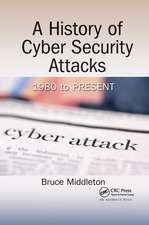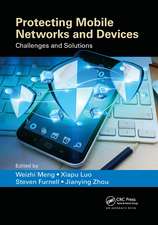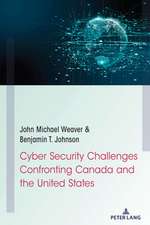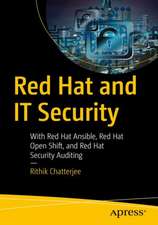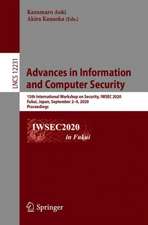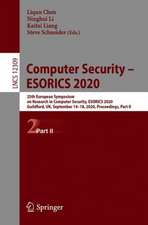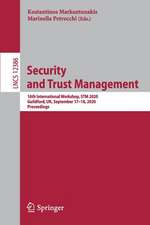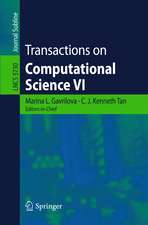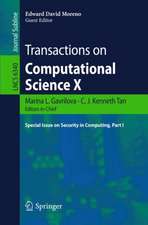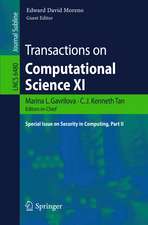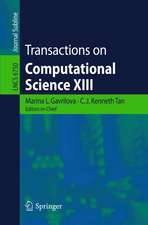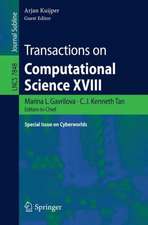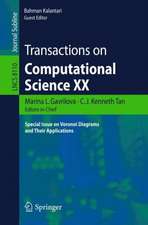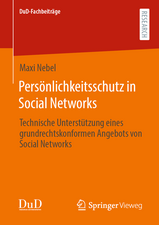Transactions on Computational Science XXXII: Special Issue on Cybersecurity and Biometrics: Lecture Notes in Computer Science, cartea 10830
Editat de Marina L. Gavrilova, C. J. Kenneth Tan, Alexei Sourinen Limba Engleză Paperback – 13 mar 2018
Din seria Lecture Notes in Computer Science
- 20%
 Preț: 1061.55 lei
Preț: 1061.55 lei - 20%
 Preț: 307.71 lei
Preț: 307.71 lei - 20%
 Preț: 438.69 lei
Preț: 438.69 lei - 20%
 Preț: 579.30 lei
Preț: 579.30 lei -
 Preț: 410.88 lei
Preț: 410.88 lei - 17%
 Preț: 427.22 lei
Preț: 427.22 lei - 20%
 Preț: 596.46 lei
Preț: 596.46 lei - 15%
 Preț: 448.04 lei
Preț: 448.04 lei - 20%
 Preț: 353.50 lei
Preț: 353.50 lei -
 Preț: 389.49 lei
Preț: 389.49 lei - 20%
 Preț: 309.90 lei
Preț: 309.90 lei - 20%
 Preț: 645.28 lei
Preț: 645.28 lei - 20%
 Preț: 763.23 lei
Preț: 763.23 lei - 15%
 Preț: 580.46 lei
Preț: 580.46 lei - 20%
 Preț: 310.28 lei
Preț: 310.28 lei - 20%
 Preț: 655.02 lei
Preț: 655.02 lei - 20%
 Preț: 1183.14 lei
Preț: 1183.14 lei - 20%
 Preț: 340.32 lei
Preț: 340.32 lei -
 Preț: 449.57 lei
Preț: 449.57 lei - 20%
 Preț: 591.51 lei
Preț: 591.51 lei - 18%
 Preț: 938.83 lei
Preț: 938.83 lei - 20%
 Preț: 337.00 lei
Preț: 337.00 lei - 20%
 Preț: 649.50 lei
Preț: 649.50 lei - 20%
 Preț: 607.40 lei
Preț: 607.40 lei - 20%
 Preț: 1414.79 lei
Preț: 1414.79 lei - 20%
 Preț: 1024.44 lei
Preț: 1024.44 lei - 20%
 Preț: 583.40 lei
Preț: 583.40 lei - 20%
 Preț: 453.32 lei
Preț: 453.32 lei - 20%
 Preț: 575.49 lei
Preț: 575.49 lei - 20%
 Preț: 1075.26 lei
Preț: 1075.26 lei - 20%
 Preț: 585.88 lei
Preț: 585.88 lei - 20%
 Preț: 825.93 lei
Preț: 825.93 lei - 17%
 Preț: 360.20 lei
Preț: 360.20 lei - 20%
 Preț: 763.23 lei
Preț: 763.23 lei - 20%
 Preț: 340.32 lei
Preț: 340.32 lei - 20%
 Preț: 504.58 lei
Preț: 504.58 lei - 20%
 Preț: 369.13 lei
Preț: 369.13 lei - 20%
 Preț: 580.93 lei
Preț: 580.93 lei - 20%
 Preț: 343.62 lei
Preț: 343.62 lei - 20%
 Preț: 350.21 lei
Preț: 350.21 lei - 20%
 Preț: 583.40 lei
Preț: 583.40 lei - 20%
 Preț: 583.40 lei
Preț: 583.40 lei - 15%
 Preț: 438.59 lei
Preț: 438.59 lei - 20%
 Preț: 341.95 lei
Preț: 341.95 lei - 20%
 Preț: 238.01 lei
Preț: 238.01 lei - 20%
 Preț: 538.30 lei
Preț: 538.30 lei
Preț: 324.49 lei
Preț vechi: 405.62 lei
-20% Nou
Puncte Express: 487
Preț estimativ în valută:
62.09€ • 64.83$ • 51.27£
62.09€ • 64.83$ • 51.27£
Carte tipărită la comandă
Livrare economică 15-29 aprilie
Preluare comenzi: 021 569.72.76
Specificații
ISBN-13: 9783662566718
ISBN-10: 3662566710
Pagini: 126
Ilustrații: XIII, 121 p. 52 illus.
Dimensiuni: 155 x 235 mm
Greutate: 0.2 kg
Ediția:1st ed. 2018
Editura: Springer Berlin, Heidelberg
Colecția Springer
Seriile Lecture Notes in Computer Science, Transactions on Computational Science
Locul publicării:Berlin, Heidelberg, Germany
ISBN-10: 3662566710
Pagini: 126
Ilustrații: XIII, 121 p. 52 illus.
Dimensiuni: 155 x 235 mm
Greutate: 0.2 kg
Ediția:1st ed. 2018
Editura: Springer Berlin, Heidelberg
Colecția Springer
Seriile Lecture Notes in Computer Science, Transactions on Computational Science
Locul publicării:Berlin, Heidelberg, Germany
Cuprins
Investigating Multimodal Warnings for Distracted Smartphone Users on the Move in Potentially Dangerous Situations.- EEG-Based Mental Workload and Stress Monitoring of Crew Members in a Maritime Virtual Simulator.- An Approach for Detecting Web Defacement with Self-healing Capabilities.- Assessing Opinions on Software as a Weapon in the Context of (Inter)national Security.- OpenGL|D - An Alternative Approach to Multi-user Architecture.- Image Quality-Based Illumination-Invariant Face Recognition.- Synthesising Images of Imagined Faces Based on Relevance Feedback.- Neurofeedback Training for Enhancement of the Focused Attention related to Athletic Performance in Elite Rifle Shooters.
Textul de pe ultima copertă
The LNCS journal Transactions on Computational Science reflects recent developments in the field of Computational Science, conceiving the field not as a mere ancillary science but rather as an innovative approach supporting many other scientific disciplines. The journal focuses on original high-quality research in the realm of computational science in parallel and distributed environments, encompassing the facilitating theoretical foundations and the applications of large-scale computations and massive data processing. It addresses researchers and practitioners in areas ranging from aerospace to biochemistry, from electronics to geosciences, from mathematics to software architecture, presenting verifiable computational methods, findings, and solutions, and enabling industrial users to apply techniques of leading-edge, large-scale, high performance computational methods.
This, the 32nd issue of the Transactions on Computational Science, focusses on cybersecurity and biometrics. The eight detailed papers cover the following topics: Multimodal Warnings for Distracted Smartphone Users on the Move; EEG-Based Mental Workload and Stress Monitoring of Crew Members in a Maritime Virtual Simulator; Detecting Web Defacement and Enabling Web-Content Regeneration; Software as a Weapon in the Context of (Inter)national Security; Multi-user Architecture and Multi-player Games; An Adaptive Discrete Wavelet Transform Based Face Recognition Approach; Synthesizing Images of Imagined Faces Based on Relevance Feedback; and Neurofeedback Training to Enhance the Focused Attention of Elite Rifle Shooters.
This, the 32nd issue of the Transactions on Computational Science, focusses on cybersecurity and biometrics. The eight detailed papers cover the following topics: Multimodal Warnings for Distracted Smartphone Users on the Move; EEG-Based Mental Workload and Stress Monitoring of Crew Members in a Maritime Virtual Simulator; Detecting Web Defacement and Enabling Web-Content Regeneration; Software as a Weapon in the Context of (Inter)national Security; Multi-user Architecture and Multi-player Games; An Adaptive Discrete Wavelet Transform Based Face Recognition Approach; Synthesizing Images of Imagined Faces Based on Relevance Feedback; and Neurofeedback Training to Enhance the Focused Attention of Elite Rifle Shooters.
Caracteristici
Includes detailed revised, extended papers from CYBERWORLDS 2016 Covers applicational areas ranging from EEG-based stress monitoring to web defacement and Content regeneration Analyses attitudes towards using software as a weapon



